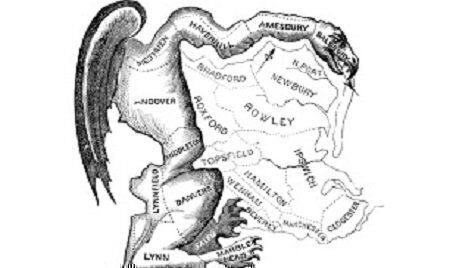For years, lawyers working on election cases have hoped that, one day, they could persuade the Supreme Court to finally decide if partisanship can go too far in drawing up new election districts. On Friday, one of those attempts appeared to have run into doubts that the Justices have power to decide it.
 The case of Harris v. Cooper comes from North Carolina – a state that has had more than its share of redistricting battles in the Supreme Court. Most of those, like a case decided last Monday, were about racial gerrymandering – that is, paying too much attention to race in drafting new maps, and was not about partisan gerrymandering – that is, skewing map lines to give one party’s candidates a special advantage.
The case of Harris v. Cooper comes from North Carolina – a state that has had more than its share of redistricting battles in the Supreme Court. Most of those, like a case decided last Monday, were about racial gerrymandering – that is, paying too much attention to race in drafting new maps, and was not about partisan gerrymandering – that is, skewing map lines to give one party’s candidates a special advantage.
But this new case developed in an odd way, and that may be the reason why the court is now questioning its authority to review it.
After a federal trial court struck down two North Carolina districts as the result of a racial gerrymander, and that case then went on up to the Supreme Court, the trial court then turned to a separate complaint that the same map was drawn too heavily in favor of Republican House candidates.
That court wound up ruling that it could not decide that issue because it interpreted past Supreme Court ruling as barring challenges to partisan gerrymanders, on the premise that there is no workable formula for judging the constitutionality of that tactic.
The appeal by two North Carolina voters in Harris v. Cooper is an attempt to get the Justices to open the courthouse doors to such partisanship claims.
Replying to that appeal, lawyers for the state argued that the voters who had sued had aimed only at racially-tinged maps, not at those drawn for partisan gain. If they wanted to challenge on that point, that filing said, they should start over with a new lawsuit targeting that.
On Thursday, the Justices took their first look at this case, pondering whether to grant it and take up the general question of partisan gerrymandering.
On Friday, though, the court told lawyers on both sides to file letters by June 6 discussing whether the voters who appealed had a legal right to challenge the map on partisanship grounds, and whether the trial court ruling was the kind that could not be appealed directly to the Supreme Court (as the voters are trying to do) but had to go through an appeals court first.
The court does not explain why it asks such questions, leaving observers to speculate whether the Justices have some larger question in their minds than simply the two jurisdictional points – such as, perhaps, clarifying how partisan gerrymandering claims in general are to be pursued in the federal courts.
Legendary journalist Lyle Denniston is Constitution Daily’s Supreme Court correspondent. Denniston has written for us as a contributor since June 2011 and has covered the Supreme Court since 1958. His work also appears on lyldenlawnews.com, where this story first appeared.







